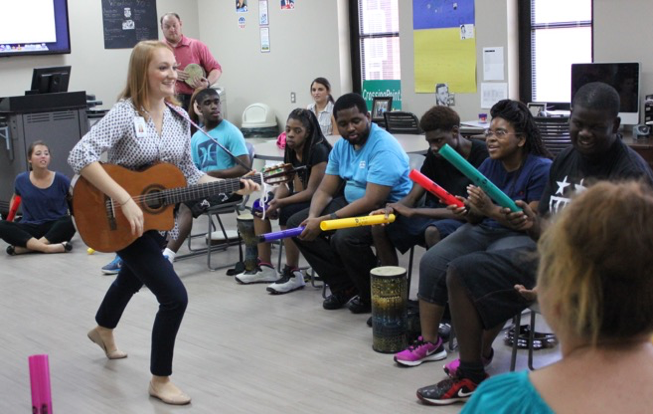by Ellary Draper, School of Music
As music therapy faculty, I am fortunate to teach multiple courses that include service learning opportunities. Service learning courses provide music therapy majors with opportunities to apply information from the classroom to clinical settings. These ‘real life experiences’ help students learn if music therapy is truly their desired career path, choose which clinical populations they prefer, and prepares students for their 6-month clinical internship.
 Service learning experiences are embedded in all four years of the undergraduate music therapy curriculum. In their first year, the students begin observing and assisting music therapy faculty and upperclassmen in various clinical settings. During their second year, the students as a class provide weekly music therapy services to older adults with memory impairments at Caring Days. Sophomores also shadow and assist upperclassmen in their weekly community placement. As they complete the final two years of the music therapy degree, each semester students are placed in two different clinical sites to provide music therapy services in the community.
Service learning experiences are embedded in all four years of the undergraduate music therapy curriculum. In their first year, the students begin observing and assisting music therapy faculty and upperclassmen in various clinical settings. During their second year, the students as a class provide weekly music therapy services to older adults with memory impairments at Caring Days. Sophomores also shadow and assist upperclassmen in their weekly community placement. As they complete the final two years of the music therapy degree, each semester students are placed in two different clinical sites to provide music therapy services in the community.
We have been fortunate to establish many service learning partnerships in the greater Tuscaloosa area. Currently, we collaborate with over 15 agencies who provide services for children and adults in our community. We partner with a variety of schools, home-based care, medical centers, and nursing facilities to provide our students with a variety of clinical experiences. These community partnerships are vital to our success in preparing students for the wide range of clients they will serve in their music therapy internships and in their life-long careers as Board Certified Music Therapists.
Participating in service learning courses throughout their four years is an essential part of their education. I believe our students are better prepared for their careers because of the amount of hands-on learning they engage in while in our program. One of my joys as a teacher is to watch my students grow as music therapists throughout their time at The University of Alabama, and through teaching service-learning courses, I can watch my students do music therapy and thrive as student music therapists.